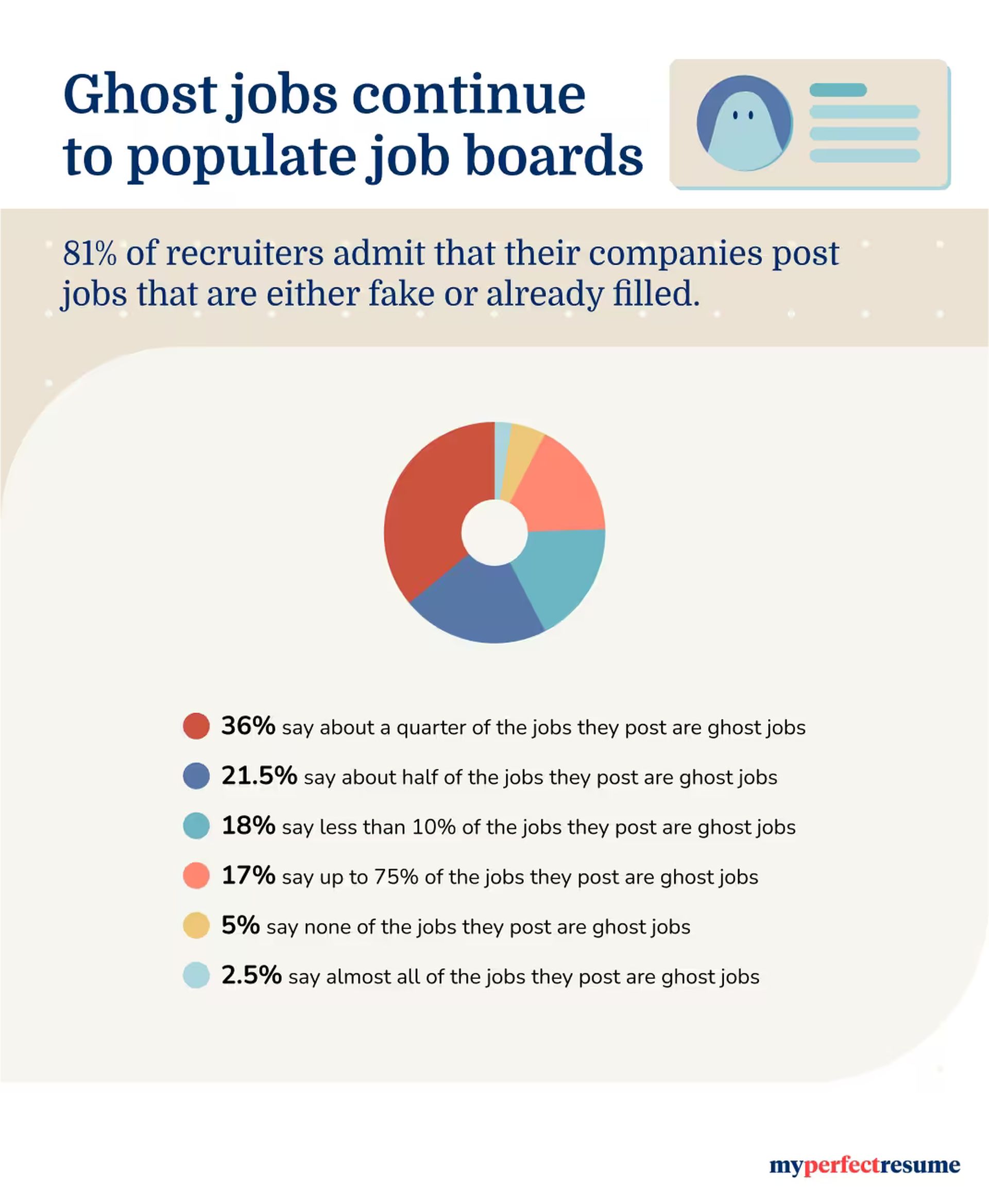The rise of ghost jobs has become a significant issue in today’s tech job market.
According to a 2024 survey by MyPerfectResume, an eye-opening 81% of recruiters admit to posting job ads for roles that are either already filled or don’t exist.
This growing trend in the tech industry is especially hard on those recently laid off or switching careers, leaving many applicants discouraged and wasting countless hours on fruitless applications.
So, why are companies posting ghost jobs, and what impact do they have on job seekers in tech?
What are ghost jobs?
Ghost jobs, as the name suggests, refer to job listings for roles that aren’t actually open for hiring. Despite appearances, these listings are not an error or oversight.
In fact, most ghost job postings are created intentionally, appearing on popular job boards like LinkedIn and even on companies’ own career pages. While ghost jobs may have once been rare or accidental, the trend is now so widespread that nearly 3 in 4 job seekers will likely encounter one.
Many of these listings have suspicious signs: unusually wide salary ranges, lack of detailed job descriptions, and long postings without updates. For tech professionals who may be laid off and urgently seeking work, ghost jobs add another layer of stress, as they send out applications that ultimately go nowhere.
Why do companies post jobs that aren’t real?
The reasons for ghost jobs range from somewhat logical to outright manipulative. One of the most common motives is simple: companies want to build a talent pipeline for future roles that may open up as budgets change. In a rapidly changing industry like tech, where hiring needs can shift quickly, having a pool of potential candidates helps companies remain flexible. But there are other reasons too.
According to the MyPerfectResume survey, around 25% of companies admit to using ghost jobs as a way to see how replaceable their current employees are. In a sense, these listings act as a tool to “test the waters” and gauge how many qualified professionals are available for a given position.

The logic here is that if a listing receives hundreds of applicants, the current employee in that role might feel more pressure to perform, knowing their replacement could be readily available.
The psychological warfare
While the idea of hiring someone in the future may sound reasonable, some motivations are more insidious. Resume Builder’s report found that about 23% of employers use ghost jobs to create a false sense of stability in an uncertain economic climate. When companies experience hiring freezes, they may keep job postings active to project an image of growth and resilience.
The tech industry is particularly susceptible to this; a posted job gives the impression that the company is still scaling up, even if it’s freezing hires behind the scenes. Unfortunately, this tactic can have serious mental health implications for job seekers, who invest time, energy, and hope into roles that never materialize.
Job seekers frequently come across these ghost listings on platforms like LinkedIn, only to spend hours tailoring their resumes, crafting cover letters, and preparing for interviews. For those already stressed by layoffs or transitioning from other industries, ghost jobs add frustration and create a sense of hopelessness.
For many, learning that they may have been applying to fake openings all along is a demoralizing experience, especially when facing other uncertainties in their career journey.
How do ghost jobs affect the tech industry?
In an industry as competitive as tech, where recent layoffs have left thousands scrambling for work, ghost jobs are making a noticeable impact on hiring dynamics. For one, the sheer volume of these listings means that candidates must now scrutinize every posting, even those on official company pages, to verify their legitimacy.
This trend complicates the hiring process for companies too.
Employers looking to genuinely fill roles often find it difficult to stand out from the false listings flooding job boards. Candidates may also become hesitant to apply for roles, fearing that their applications will land in an endless loop of fake positions or that they’ll spend time interviewing for a job that doesn’t actually exist.

For many, these false listings raise questions about ethical hiring practices. If companies continue to flood job boards with ghost jobs, they risk losing credibility in the eyes of tech professionals. Employees may grow wary of organizations that prioritize maintaining an “always hiring” image over being transparent about their actual needs.
In an industry already facing scrutiny over layoffs, attrition, and shifting demands, ghost jobs further cloud the relationship between tech companies and the workforce they aim to attract.
A troubling trend with no clear solution
Despite the frustration that ghost jobs cause, they aren’t likely to disappear soon. In an environment where companies constantly adapt to economic pressures, the need for talent and the desire to stay competitive will continue to drive these practices.
However, as awareness of ghost jobs grows, tech professionals are becoming more savvy about identifying and navigating these false openings. A proactive, informed approach can help job seekers avoid wasting time on ghost jobs, but the issue remains a troubling trend in modern hiring.
Image credits: Emre Çıtak/Ideogram AI





